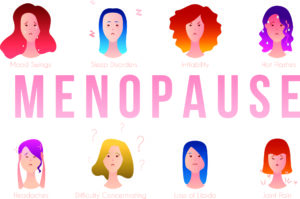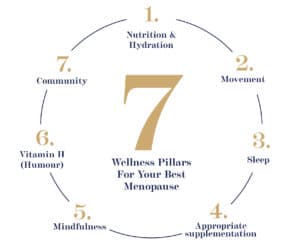Menopause Frequently Asked Questions

Do you have a few menopause FAQs (frequently asked questions) you’d like answered? Well, wait no more!
Just like puberty and pregnancy, perimenopause, menopause and post-menopause are key phases in a woman’s life. Indeed, it’s a time of change and hormonal ups and downs that all too often catch us unawares. So when, and if, you connect the dots it often sends you on a quest for information.
In light of this, we’ve put together a few of the most common questions you ask, And we’ve added brief answers as well as links for more in-depth information. Because we genuinely hope they help to make your transition easier. That said, we might have missed something! So, if you have other questions please don’t hesitate to reach out to us here.
Menopause is not a disease – it’s a normal, natural event – defined as the final menstrual period. It’s usually confirmed when a woman has missed her periods for 12 consecutive months (with no other obvious causes). So she only knows she’s reached it in hindsight.
Indeed, it’s a lifestage associated with reduced functioning of the ovaries resulting in lower levels of estrogen and other hormones. You’ve officially reached menopause when your ovaries stop producing eggs and periods and fertility come to an end. Natural menopause typically occurs around the age of 51 and most often between ages 45 and 55.
See our full article: What Is Menopause?
This can be a chaotic stage! ‘Peri’ means near and is the years leading up to menopause. It’s a gradual transition from the reproductive years to end of fertility and ti can last a long time. What’s more, during this time a woman’s estrogen levels can fluctuate wildly.
Perimenopause begins (on average) four to 10 years before the final period. It usually starts when a woman is in her early to mid-40s and her reproductive hormones begin to decline. And it’s these hormonal shifts that can cause symptoms in some women.
Post-menopause is the rest of your – hopefully – long and happy life! It’s all the years of a woman’s life beyond menopause. The irony is you’re already there 12 months after your last period because you don’t know when your last bleed is until that timemark. The signs of peri/menopause gradually decline and disappear for many women who breathe a sigh of relief. And it’s during these years that her sex hormones should stabilise somewhat. However, lower levels of estrogen can lead to increased risk of heart, brain, bone disease and other conditions.
Menopause, whether natural or artificial, is called premature when it happens at age 40 or younger. POI or primary ovarian insufficiency is the official term for the partial or total loss of ovarian reproductive function before 40. And this can be due to chemotherapy or radiation treatment, autoimmune disease, genetics or enzyme deficiency. According to the International Menopause Society POI occurs in one per cent of the global population, in 1/1000 women under the age of 30 and 1/10000 women under the age of 20. You can read the Society’s white paper on POI for more info.
Also known as surgical or induced menopause, artificial menopause occurs earlier – usually before 40 – than the ‘average’ age for menopause of 51/52. It’s often the result of a full hysterectomy and the surgical removal of both ovaries (bilateral oophorectomy) although chemotherapy-induced menopause can fall under this banner too. Hysterectomies may be performed due to risk of cancer, severe endometriosis or chronic pelvic pain. Unfortunately, the abrupt cessation of ovarian hormone function causes menopausal symptoms to come on rapidly.
Note: if a woman undergoes hysterectomy but her ovaries are left intact she will still go through natural menopause.
That depends. And you may not even notice any changes. The good news is, quite a few women don’t. However, 65-70 per cent experience moderate to severe symptoms. There are 34 recognised symptoms of menopause, the most well-known of which are hot flushes (hot flashes).
Know the 34 symptoms of menopause
Physical symptoms
- Allergies
- Bloating
- Body odour changes
- Brain Fog
- Breast tenderness
- Burning mouth syndrome
- Digestive issues
- Dizziness
- Electric shock sensations
- Fatigue
- Formication
- Hair changes
- Headaches
- Hot Flushes
- Incontinence & UTI’s
- Irregular heartbeat
- Irregular periods
- Itchy skin
- Joint pain
- Loss of libido
- Muscle Tension
- Night sweats
- Oral problems
- Osteoporosis
- Paresthesia
- Sleeping difficulties
- Vaginal dryness and/or atrophy
- Weakened fingernails
- Weight gain
Psychological symptoms
- Anxiety
- Depression
- Irritability
- Mood Swings
- Panic disorder
There’s so much you can do with lifestyle science. And a good diet, ensuring you have optimum levels of nutrients as well as regular movement have all been shown unequivocally to help minimise the symptoms of menopause.
We also provide and recommend Merry Peri® and Perky Post®.
Several natural treatments have shown evidence of helping to ease the symptoms of menopause including cognitive behaviour therapy (CBT), breath work, yoga and Pilates, acupuncture, meditation and mindfulness.
The simple answer to this question is whole foods like fruit and vegetables, moderate quantities of fish and healthy fats or PFF – protein, good fat and fibre. Typically a Mediterranean-style diet is considered optimum. Equally important is avoiding refined sugars or processed foods. Try these six foods to balance hormones.
There is no ‘best’ exercise per se. What’s more important is what is best for you as an individual and that you move for at least 30 minutes per day. Every. Body. Is. Different. Exercise is key to helping to ease symptoms and also to help keep you strong and healthy and your brain on high alert as you grow older. However, more and more research is coming out showing that HIIT (High-Intensity Interval Training) and its sister – Tabata – are particularly beneficial for women post-40.
It’s very individual but optimum nutrient levels are crucial during menopause. We have found magnesium, vitamin D3, calcium, essential fatty acids, iron, zinc and vitamins B, C and E are all good to have on hand. Finding a good multivitamin, that is not loaded up with inexpensive fillers is important. And remember it all begins with the gut so taking a probiotic can be helpful too. Without good digestive health, your body won’t absorb nutrients well. It takes about three months to get your nutrient levels back up to scratch if they’ve been lacking. Learn more about menopause here.
Yes. Some doctors will test your hormones via blood tests however these are unreliable as your levels can change from day today. If you have a medical menopause specialist they may be able to do more detailed testing. With that said, blood tests may become more sensitive in the future. A new study shows a blood test may soon be able to predict when a woman’s final period will be though more research is needed. From the perspective of a functional medicine lens, the most well-regarded test is called the DUTCH (Dried Urine Test For Comprehensive Hormones) Test which gives a detailed reading of hormone levels. Available in Australia and New Zealand from Nutrisearch.
How long is a piece of string? Because every woman is unique her transition to menopause will be too. The average time is about four years, but for some women, it’s up to 10 years. Dr Christiane Northrup, renowned women’s health expert and the author of The Wisdom of Menopause Dr Christiane Northrup OB/GYN suggests a guideline of 6-13 years.
While no one can predict how an individual woman will experience menopause some studies suggest it would be a good idea to ask your mother how she fared. This study of 164 mothers and daughters showed a 44 per cent heritability factor. And this 1995 research showed a family history could contribute to early menopause.
Absolutely, and some women do so when others talk about their symptoms or how they’re struggling it’s difficult for them to understand. The Australasian Menopause Society tell us that 20 per cent of women will have no symptoms at all, 60 per cent will have mild symptoms for around four to eight years and 20 per cent will be severely affected, with symptoms continuing into their 60s or later.
This study showed there is a high rate of suicide among women aged 45-54 years which researchers found may be related to the biological changes of menopause. And it’s not unusual for women to feel like they’re going crazy during the hormonal upheaval of perimenopause. Or, to become more susceptible to anxiety, depression and panic attacks. These can be a heavy load to bear but it’s important to realise that it’s not you, it’s your hormones. Also, it’s crucial you reach out for help to people or organisations (like us) who specialise in menopause. We know all too well that it’s more to do with hormonal imbalance than you being mentally ill. What’s more, we can both support you and give you tools to get you through and find your mojo again.
Symptoms of perimenopausal depression:
- Natural botanical formulation
- Evidence-based and designed to support women in all stages of menopause
- Presented in VEGE capsules – suitable for vegetarians and vegans
We have a community of 40+ women in our private Facebook group: The 40+ Club for Ageless Goddesses and an active Facebook page here.
We pride ourselves on having an extensive library of evidence-backed articles on menopause and women’s wellness.
A Heartfelt Thank You ✨✨✨
Thank you SO much for joining us on our deep dive into the ins and outs of menopause: What Is Menopause?, The Signs & Symptoms of Menopause and Frequently Asked Questions.
We hope we have enlightened you, inspired you, set your mind at rest. As well as given you some practical tools to take forward so you can live the life of vitality and happiness you deserve. Indeed, it’s an honour and a pleasure to serve you and please don’t hesitate to reach out to us directly here.
Please take a moment to sign up to our newsletter below. We send out regular news and offers. And we aim to keep you informed and empowered, share others stories and give you all of the news about our latest promotions and giveaways.
We’d love it if you’d follow us on YouTube, Facebook or Instagram where we share tips, inspiration and fun.
If you have a personal story of your menopause journey that you’d like to share with other women in our community we have a form where you can do so here. Real stories help others so much and we thank you for being a beacon of light.
Disclaimer: Our articles are for information only and intended to educate from a holistic point of view. They should not take the place of medical advice. Certain diet and exercise practise may be beneficial for the majority of people but could have potential risks for others. If you are contemplating lifestyle changes or you have ongoing concerns please consult your healthcare provider.










